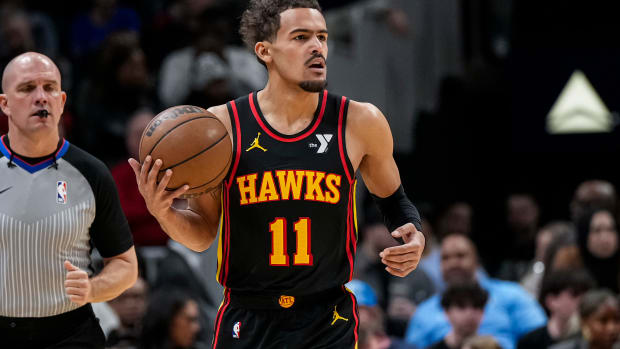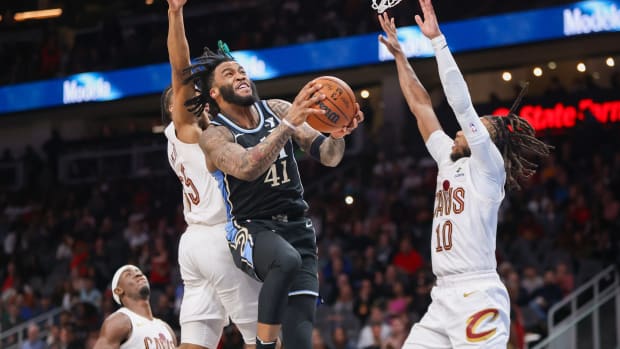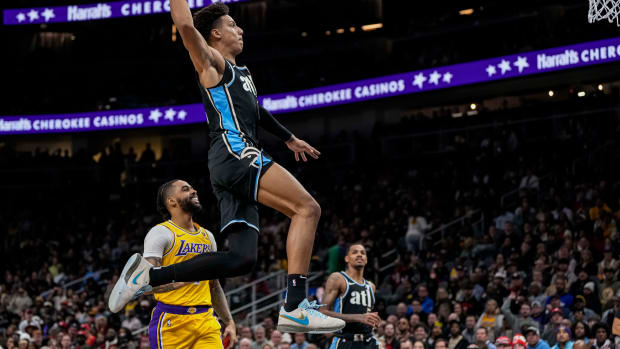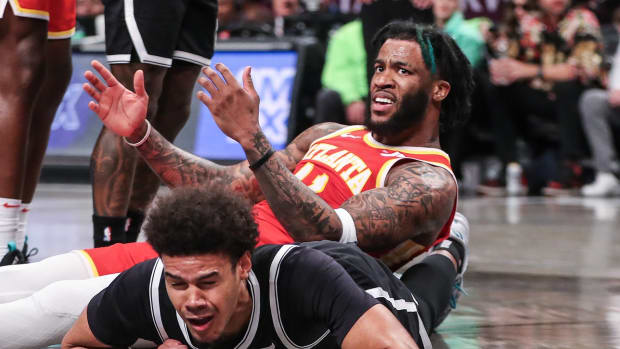Without Collins, Slumping Hawks Scramble For Answers
The cost of John Collins’ 25-game absence isn’t just his 17 points and nearly nine rebounds per game, it’s that the Hawks are stretched even thinner in what was already an area of weakness. That much was clear Sunday night as Atlanta fell to the Portland Trail Blazers, 124-113, and will remain among the team’s most pressing issues moving forward.
Any franchise would suffer from losing a player of Collins’ caliber; he energizes an offense in a manner very few complementary players can and was beginning to round into a more complete scorer and defender. But for the Hawks, his absence destabilizes the entire frontcourt rotation. Everyone – from Jabari Parker to De’Andre Hunter to DeAndre’ Bembry – must suddenly shoulder more weight than before, and only so many players can handle scaling into larger roles.
Parker has filled in quite capably as a starter, but finding a replacement for him on the second unit has proven more challenging. Useful as it is to have his punch in the opening lineup, the luxury of bringing an efficient scoring weapon off the bench is now lost, and an already tenuous center rotation has been pressed into even heavier duty.
Parker has been a revelation on offense, averaging 22.4 points and eight rebounds in his last five games. He’s rarely missing from 2-point range thanks to a team-high 18 dunks during that stretch (that ranks second in the league behind Giannis Antetokounmpo) and has rediscovered the combination of power, agility, and touch in the paint that made him a tantalizing weapon in Milwaukee. The defensive tradeoff, however, has been costly. It’s what separates Collins, who had been playing the best defense of his career prior to his suspension, from Parker, who remains one of the least attentive defenders in the NBA. The burst and physicality that often makes Parker unstoppable on offensive has never translated into lateral quickness or defensive aggression. He compounds the issue by missing rotations and spacing out away from the ball, and some of his closeouts make traffic cones look agile:
Whatever his defensive foibles, however, Parker provides enough offensive utility to justify starting and closing games. The question of whom to pair him with has been a far thornier issue. Without Collins, Atlanta doesn’t have an above-average center on its roster; the carousel of Alex Len, Damian Jones, and Bruno Fernando leaves Lloyd Pierce deciding between the least of three evils. Len has had a nightmare start to the season, averaging four points and shooting 11.8 percent from 3 (many of his misses haven’t been particularly close). His primary skill last season was his ability to stretch defenses away from Trae Young, but if his shots aren’t falling, it’s unclear what value he really provides. Len isn’t good enough in the post to eat up possessions on the block and doesn’t connect the offense as a passer or mover. He might have the worst hands of any starting center in the league:
Len might be Atlanta’s best defensive center at the moment, though Fernando is more versatile and has grasped the team’s concepts and rotations fairly well for a rookie – it might be worth exploring what he looks like playing with the starters. Jones has emerged as a favorite of Pierce’s, though it isn’t clear why. His mishaps aren’t always visible in the same way Len’s or Fernando’s are, but Jones’ limitations as a defender and finisher are harmful nonetheless. Despite his impressive leaping ability, Jones is slow to change direction and get off the ground, which prevents him from snaring rebounds or blocking shots other centers grab with ease:
His mobility issues are intensified by a lack of physicality, and while he can approximate the vertical spacing Collins provided, Jones doesn’t have nearly the same hands, explosion, or instincts around the rim. The ball must be put right on his hands for him to catch and finish with any sort of fluidity, and Jones remains a non-threat from anywhere outside the paint. Young palliates that issue with pinpoint lobs and dropoff passes, but things still get hairy when Jones ventures beyond his comfort zone.
Pierce could work around these issues more easily if he had the option of playing Collins at center. Instead, he must fill those minutes with inadequate alternatives. Sunday night was perhaps the most creative Pierce has been in trying to find a solution to his frontcourt issues, which cast into stark relief just how much the Hawks miss Collins. Vince Carter didn’t see the court and Pierce closed the game mostly with no center on the floor, instead playing Parker at center and De’Andre Hunter at power forward. Atlanta has seldom used that alignment in its first nine games, so there isn’t a large enough sample to make conclusive assessments of that pairing.
In theory, it should give Young plenty of space to operate when he has the ball and help stretch defenses a touch more when he’s off the court. Given time to coalesce, those units could be offensive juggernauts. But as was the case when Collins played center last season, the Hawks will struggle – if not fail entirely – to stop anyone with Parker at center.
Adjusting to life without Collins hasn’t been easy on Young, either. There are certain concessions a defense must make when both the ball-handler and screener in a pick-and-roll are capable of inflicting maximum damage on any given play. Young is a master at exploiting those sacrifices, but no longer has a partner who consistently forces them. Now unconcerned the threat of Collins at the rim, opponents can train their focus more squarely on taking away Young’s scoring opportunities and still recover in time to challenge ground-bound big men at the rim:
Atlanta now owns the third-worst offense in the NBA after scoring just a point per possession against what has been a flimsy Portland defense. In keeping with a trend from last season, the Hawks have underperformed their expected shot quality by over three percentage points, per pbpstats.com. Those figures are likely due for some improvement, but the Hawks currently lack the ancillary threats to maximize Young’s playmaking prowess. In the four games since Collins’ last appearance, Young has finished nearly 35 percent of Atlanta’s possessions with a shot, turnover, or free throw while assisting on over 45 percent of the Hawks’ buckets. His efficiency, however, has sunk drastically under that load without another weapon off of whom to work.
That weapon is on Atlanta’s roster, but won’t be available for another 21 games. Until then, the Hawks will keep searching for answers they may never find.





